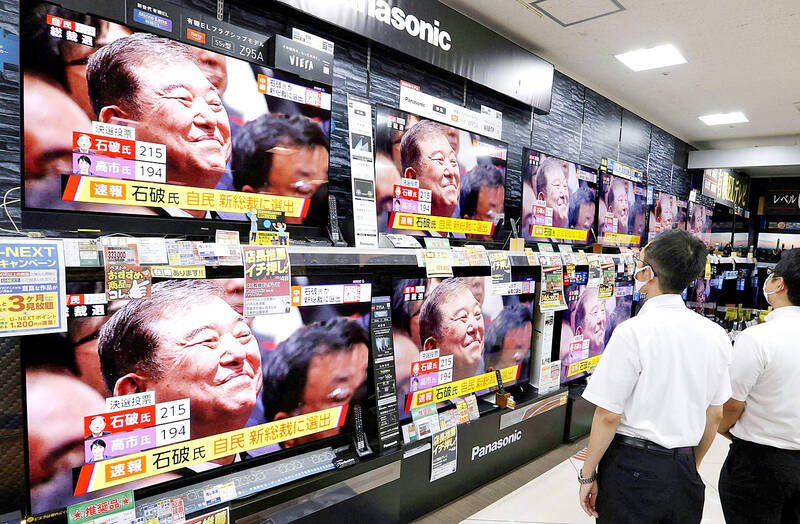Newly elected Liberal Democratic Party (LDP) leader and soon-to-be Japanese prime minister Shigeru Ishiba is likely to seek stable relations with China while also continuing economic cooperation with Taiwan, Taiwanese academics said on Friday.
The LDP on Friday elected Ishiba as its president. As it has a majority in the Diet, it is widely expected that he would become the country’s new prime minister on Tuesday, when the new parliamentary session opens.
Ishiba’s top priority would be to improve Japan’s economic situation, which has led to declining support for the LDP under Japanese Prime Minister Fumio Kishida, said Li Shih-hui (李世暉), chairman of the Taiwan Japan Academy and a professor at National Chengchi University’s College of International Affairs.

Photo: Kyodo / via Reuters
The result of November’s US presidential election and the new US president’s security policy toward China are also important factors to consider, Li said.
The Taiwan Strait remains a major strategic interest in the US-Japan relationship, but further progress in Taiwan-Japan ties would be mentioned in Ishiba’s upcoming policy speech to the parliament, Li said.
If the Taiwan Strait or East Asian security concerns are mentioned, that would be a positive for Taiwan and the country’s national security establishment should look to establish dialogue with Ishiba’s team, Li said.
Taiwan-Japan ties would continue to develop steadily, albeit cautiously in the face of pressure from China, Institute for Policy Research senior consultant Chen Wen-jia (陳文甲) said.
Ishiba, a former Japanese minister of defense, has advocated for Japan to strengthen its military capabilities, engage in diplomacy independent of the US and to take on a larger role in the region, Chen said.
Outside of former Japanese prime minister Shinzo Abe’s time in office, Taiwan has not been a policy priority within Japan’s cabinet, Li said.
Li expects Ishiba to continue Kishida’s focus on economic issues in the country.
Taiwan should find bilateral policy issues on which the two countries can work together and improve ties, such as collaborating on scientific and technological development and research, Li added.
Ishiba’s focus on economic issues means that deepening economic ties between the two countries would be an important priority, especially in areas such as supply chain security and technological innovation, Chen said.

Taiwan yesterday condemned the recent increase in Chinese coast guard-escorted fishing vessels operating illegally in waters around the Pratas Islands (Dongsha Islands, 東沙群島) in the South China Sea. Unusually large groupings of Chinese fishing vessels began to appear around the islands on Feb. 15, when at least six motherships and 29 smaller boats were sighted, the Coast Guard Administration (CGA) said in a news release. While CGA vessels were dispatched to expel the Chinese boats, Chinese coast guard ships trespassed into Taiwan’s restricted waters and unsuccessfully attempted to interfere, the CGA said. Due to the provocation, the CGA initiated an operation to increase

CHANGING LANDSCAPE: Many of the part-time programs for educators were no longer needed, as many teachers obtain a graduate degree before joining the workforce, experts said Taiwanese universities this year canceled 86 programs, Ministry of Education data showed, with educators attributing the closures to the nation’s low birthrate as well as shifting trends. Fifty-three of the shuttered programs were part-time postgraduate degree programs, about 62 percent of the total, the most in the past five years, the data showed. National Taiwan Normal University (NTNU) discontinued the most part-time master’s programs, at 16: chemistry, life science, earth science, physics, fine arts, music, special education, health promotion and health education, educational psychology and counseling, education, design, Chinese as a second language, library and information sciences, mechatronics engineering, history, physical education

The Chinese military has boosted its capability to fight at a high tempo using the element of surprise and new technology, the Ministry of National Defense said in the Quadrennial Defense Review (QDR) published on Monday last week. The ministry highlighted Chinese People’s Liberation Army (PLA) developments showing significant changes in Beijing’s strategy for war on Taiwan. The PLA has made significant headway in building capabilities for all-weather, multi-domain intelligence, surveillance, operational control and a joint air-sea blockade against Taiwan’s lines of communication, it said. The PLA has also improved its capabilities in direct amphibious assault operations aimed at seizing strategically important beaches,

‘MALIGN PURPOSE’: Governments around the world conduct espionage operations, but China’s is different, as its ultimate goal is annexation, a think tank head said Taiwan is facing a growing existential threat from its own people spying for China, experts said, as the government seeks to toughen measures to stop Beijing’s infiltration efforts and deter Taiwanese turncoats. While Beijing and Taipei have been spying on each other for years, experts said that espionage posed a bigger threat to Taiwan due to the risk of a Chinese attack. Taiwan’s intelligence agency said China used “diverse channels and tactics” to infiltrate the nation’s military, government agencies and pro-China organizations. The main targets were retired and active members of the military, persuaded by money, blackmail or pro-China ideology to steal